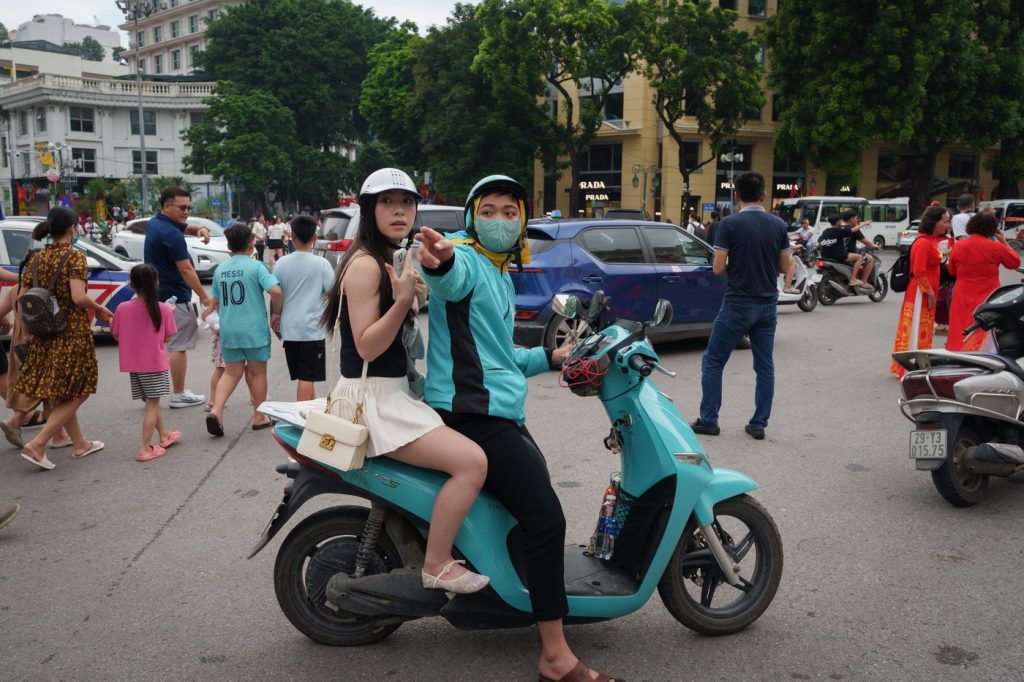HANOI, Vietnam (AP) — Vietnam faces a pivotal moment as it wrestles with two competing visions of its transportation future: the gas-powered motorbikes that dominate the roads today and the sleek, silent electric bikes that the government envisions for tomorrow. In a bid to cut emissions and combat air pollution, Hanoi plans to ban fossil-fuel motorcycles from its city center starting July 2026. Ho Chi Minh City is considering a similar initiative, with Vietnam aiming for one-third of cars and over 20% of motorbikes to be electric by 2030.
The announcement has sparked a debate among the Vietnamese populace. Many view this transition as an opportunity to move away from traditional, smoke-belching engines towards cleaner, quieter alternatives. However, concerns persist among consumers regarding the affordability, range, and charging convenience of electric models. Currently, gas-powered bikes are more economical, more durable, and easier to maintain for most riders.
The motorbike culture is deeply embedded in Vietnamese society, with 77 million two-wheelers in the country—7 million in Hanoi and 8.5 million in Ho Chi Minh City—serving as not only a means of transport but also a vital component of daily commerce. Small business owners rely on motorbikes to navigate busy streets, and families often transport multiple generations on a single vehicle.
As delivery drivers scramble to adapt, electric bike startups are emerging, with a marked increase in e-bike sales. Notable motorbike manufacturers like Honda and Yamaha express skepticism, arguing that the 2026 ban is overly ambitious. Meanwhile, local electric vehicle companies such as Dat Bike and VinFast, the latter backed by the conglomerate VinGroup, are optimistic about the future of electric transport.
Ta Manh Cuong, a ride-hailing driver, refers to his reliable gas-powered bike as his "iron horse". He expresses interest in shifting to an electric model but highlights the cost barrier as a significant factor keeping him from making the switch. Despite the challenges, Vietnam’s motorbike market remains robust, totaling approximately 3.5 million units sold annually, making it the second-largest in Southeast Asia and notable for its rapid electrification, with electric motorbikes representing about 12% of total sales.
Transitioning to electric vehicles is crucial for reducing harmful emissions and improving air quality. Zifei Yang from the International Council on Clean Transportation emphasizes the energy efficiency of electric vehicles compared to gas engines, pointing to the alarming statistic of approximately 70,000 deaths annually in Vietnam linked to air pollution. Unlike cars, the motorbikes sold in Vietnam are primarily produced domestically, suggesting that the shift to electric could bolster local manufacturers and encourage investment into the market. Such progress may serve as a model for other developing nations.
Following the impending ban, there has been a significant spike in electric motorbike sales, with purchases of smaller electric bikes increasing by 89% and full-sized models by an astounding 197% in the first eight months of 2025. VinFast has emerged as a leader in this booming market, quadrupling its sales and surpassing competitors like Yadea.
Government incentives, such as subsidies for scrapping old motorbikes, and enhanced public transport options in crowded city areas, are expected to facilitate the adoption of electric vehicles. Yang mentions that the introduction of battery-swapping stations could also aid in addressing concerns over charging wait times. Additionally, advancements in battery technology could simplify the charging process for homeowners.
In a bid to transition itself, Ho Chi Minh City plans to replace 400,000 gasoline motorbikes with electric variants by 2028 and will initiate a ban on gas bikes for ride-hailing and delivery services in 2026. The city also aims to implement financial incentives, such as low-interest loans and tax breaks, and create low-emission zones to drive down pollution levels.
VinFast is strategically positioned to benefit from this shift, as its ride-hailing company, Green SM, temporarily overtook Singapore’s Grab to become the market leader in Vietnam. The firm plans to launch a battery-swapping electric motorbike priced around $760 and has set ambitious goals to establish 150,000 battery-swapping stations nationwide within a three-year timeframe.
To boost electric vehicle adoption, VinFast is collaborating with local banks to offer financial support, potentially covering up to 90% of costs for prospective electric bike owners. Dat Bike is also receiving attention, having recently raised $22 million in a funding round to enhance its production and sales capabilities.
Despite holding over 80% of the market share, Honda and Yamaha caution against rushing the transition, stressing that the 2026 deadline may strain consumers and manufacturers alike. While Honda only began introducing electric bikes this year, it has voiced concerns regarding the feasibility of replacing millions of bikes in such a short timeframe. Yamaha stated it is currently reviewing the proposed ban.
As businesses brace for the transition, many are cautious yet hopeful. Bao Ngoc Cao, who rents motorbikes to expatriates and tourists, admitted to feeling "terrified" upon hearing news of the ban, citing her business's reliance on affordable access to motorbikes. Nevertheless, she supports the initiative's goals and eagerly awaits further clarity on the implications for her business.











